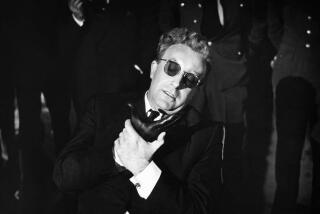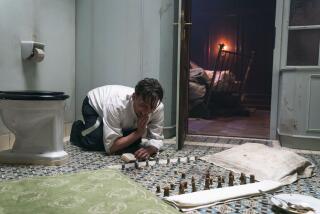Original ‘Dr. Strangelove’ and His Game of War : PRISONER’S DILEMMA, <i> By William Poundstone,</i> Doubleday, $22.50, 288 pages
- Share via
Imagine yourself sitting in a jail cell, accused of armed robbery. Your partner in crime is in another cell down the hall. You can’t communicate with each other. Should you act in your own self-interest and blame everything on your partner, or should you stonewall the police? You are in a so-called “prisoner’s dilemma.”
Game theorists have discovered from their computer simulations that most people in a prisoner’s dilemma will rat on their partner to save their own skins, writes William Poundstone. Even if they stand to gain more by cooperating than by acting selfishly, most people still put themselves first, out of distrust for their fellows.
For game theorists--the mathematicians, political scientists, economists and other researchers who try to predict human behavior mathematically--the prisoner’s dilemma is a metaphor for the uneasy relationship which, until recently, existed between the United States and the Soviet Union. In Poundstone’s eye-opening adventure story of applied higher mathematics, he writes that in 1950 the game theorists at RAND Corp. and Princeton’s Institute for Advanced Study predicted that the Soviet Union would bomb the United States as soon as it could.
“Prisoner’s Dilemma” tells two interwoven stories--the history of game theory and its military application in the postwar years, and the biography of the theory’s brilliant inventor, John von Neumann. Von Neumann, considered by some to be the 20th Century’s most brilliant thinker (he also invented the critical components of the digital computer), died in 1957 of bone cancer.
Von Neumann was no rumpled, introverted mathematician. An ebullient child prodigy who at 6 memorized entire pages of the telephone book to amuse his parents’ friends, the Hungarian-born aristocrat (his banker father bought the family’s title) dressed fashionably, drove Cadillacs and entertained often and lavishly in his opulent house in Princeton, N. J. His only child, a daughter from his short first marriage, became a vice president of General Motors.
During World War II and the years following, von Neumann commuted between the RAND Corp.’s Santa Monica headquarters and Princeton, directing the work of the game theorists, and advising Presidents Truman and Eisenhower on nuclear war strategy. Both were urged by the theorists to bomb the Soviet Union into oblivion before the Soviets could attack the United States--to wage what they called a “preventive war.”
“If you say tomorrow, I say today. If you say 5 o’clock, I say 1 o’clock,” said von Neumann, (Poundstone says von Neumann is thought to have inspired Dr. Strangelove, Stanley Kubrick’s wheelchair-bound, Nazi-saluting advocate of annihilating the Russians.)
For Poundstone, the international implications of the game theorists’ findings are depressingly clear--despite the recent disintegration of the Soviet Union. As the author gloomily puts it, “Possibly all civilizations contemplate total war, narrowly avert disaster a number of times and succeed at disarmament for a while. Then comes one last crisis in which the voices of collective reason are too weak to forestall planet-wide holocaust--and that’s the reason why we can’t detect any radio transmissions from intelligent beings out there.”
“Prisoner’s Dilemma” jump-cuts between scenes from von Neumann’s life and technical explanations of arcane mathematical concepts. As a result, it suffers a bit from fragmentation and abrupt shifts in focus. But author Poundstone explains game theory lucidly, reveals some hair-raising postwar governmental skulduggery and brings to life one of history’s foremost mathematicians.
Next: Jonathan Kirsch reviews “Unreasonable Behavior” by Don McCullin (Alfred A. Knopf).


